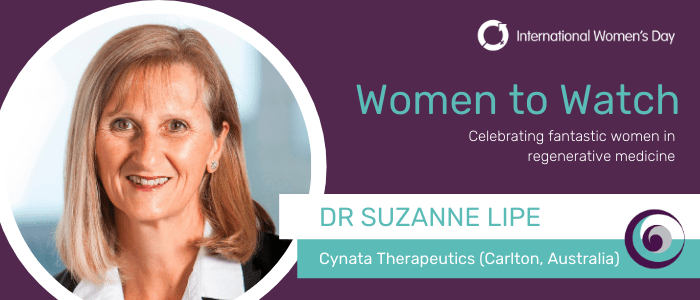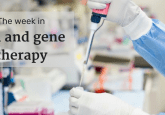Women to Watch: accelerating the development of MSC products with Dr Suzanne Lipe

As part of our ‘Women to Watch’ series on RegMedNet, we’re putting Dr Suzanne Lipe into the spotlight. Dr Lipe is the Vice President of Partner Engagement at Cynata Therapeutics (Carlton, Victoria, Australia), which is a clinical-stage stem cell and regenerative medicine company focused on the development of therapies based on Cymerus™, a proprietary therapeutic stem cell platform technology. Cymerus production methods use induced pluripotent stem cells (iPSCs) to achieve economic manufacture of mesenchymal stem cell (MSC) therapeutic products for a wide range of challenging diseases.
Her role as Vice President of Partner Engagement is a testament to the importance of finding and working with the right collaborators to develop their technology and then to identify and work with the right commercialization partners to take Cynata products through to clinical practice and patient care. With much research being published on the effectiveness of MSCs in regenerating damaged or injured tissues, her role is to bring together the research science, industrial scale-up manufacturing and commercial requirements to accelerate development and approval of Cynata’s Cymerus MSC regenerative medicine products.
Can you provide us with an overview of what your work involves?
The development of Cynata’s iPSC-derived cell therapy products requires leveraging expertise from different teams within university and commercial sectors from around the world, closely working together to optimize as best as possible, the development outcome.
I engage with new potential partners and collaborators to manage the process in the early stages, to map out all the party’s interests, understand and align our development or commercial objectives, then agree on a project plan, milestones and deliverables. The overall objective is to ensure safety and optimization of our products, obtain regulatory approvals and make our regenerative medicine products available to patients as soon as we can.
Networking, research and understanding the regulatory pathway are all critical requirements of my role that help to identify potential gaps in our knowledge or processes to be addressed as we work towards product approval. Identifying complementary skills, sharing our vision and integrating the right partners is critical to our success.
Once we have agreed on the principles of engagement, I drive the partnership process putting structure and agreements in place and then manage the ongoing relationship.
What inspired you to work in regenerative medicine and the biotechnology industry?
I worked in medical research for a number of years before and after completing my PhD, when small drug molecules were the mainstay of pharmaceutical development and was drawn to late-stage clinical development, then marketing of approved products.
Breakthroughs in the development of regenerative medicines have opened exciting new treatment modalities. Many regenerative medicines are being developed for high needs diseases where current treatment options are severely lacking. I was inspired to be a part of this new treatment paradigm, to help drive development of new safe and effective therapies to improve patient’s lives by leveraging my knowledge in research, drug development and marketing.
Have you ever in your career felt that you were at a disadvantage owing to your gender?
I feel fortunate to be working in the healthcare sector, which is well represented by women working in this industry. I have never felt and never allowed my gender to be a disadvantage in the workplace. The innovation industry values knowledge, experience and ideas, no matter who is providing it. This is true of the biotechnology industry, which has provided me with many opportunities to take on executive leadership roles in development, operations, manufacturing and commercialization.
It is particularly the case whilst working at Cynata and in the regenerative medicine space, which being so rapidly growing, values input from all sources, to translate innovative ideas and experience to develop its important new medicines for patients.
The only real aspect in which I felt my gender was a disadvantage, was with a lack of board member appointment opportunities for women in general, as well as in the biotechnology and healthcare sector.
Did you notice any difference in opportunities available to women, or in how you were treated, as you gained more senior positions over your career?
Talented women are highly represented in middle management of companies, but there still seem to be fewer opportunities for women to break through to ‘C’ suite roles. While women can be very talented, we seem to be reluctant to extol our own virtues, waiting instead for unsolicited peer recognition. As successes build, our confidence grows and we take on more senior, challenging and rewarding roles. Further opportunities present as we demonstrate our capability and value to our organizations and the industry.
This has been my experience, that women’s opportunities come through delivery and performance, rather than our networks or ability to ‘market’ ourselves.
In your opinion, what more could be done to promote gender equality in your field?
Women should be provided more opportunity to participate in public events showcasing their skills, knowledge and innovative ideas and be better represented on decision-making committees and negotiating commercial tables. Women should be actively encouraged to speak out about their ideas, while meeting moderators be trained to draw out balanced and fair discussion time, managing those over-represented in the dialogue.
Through demonstrated capability and achievements, women will be better accepted as leaders in our field and achieve greater gender equality at the most senior levels in our industry.
What advice would you give to young women hoping to pursue a career in your field?
The biotech and regenerative medicine sector need its workforce to be experienced, multi-skilled and flexible. Put your hand up to take whatever opportunity presents itself to acquire new skills and experience. Step out of your field of expertise and comfort zone and cross-train along the whole development and commercialization pathway to increase your potential value to the organization.
Be vocal, be heard, present your ideas and do not be afraid to stand out on a limb. Even if you are not entirely confident you have the correct solution to an issue, your ideas might be the trigger that opens the team discussion to find the answers. Empower the people around you and together you will achieve amazing things.
Lastly, which women in the field of regenerative medicine have inspired you most?
Professor Nadia Rosenthal was the Founding Director, establishing the Australian Regenerative Medicines Institute at Monash University (Melbourne, Australia) in 2007. She had a passion to use regenerative medicines and her related discoveries to reverse damage to the myocardium following myocardial infarction. She led the understanding that MSCs could contribute to repair through intercellular organelle transfer (e.g., mitochondria) through tunneling nanotubes from MSC’s to cardiomyocytes. Her passion for the role of regenerative medicine was one of my earliest inspirations for working in this industry.
Acknowledgements
This interview was put together and conducted by our Senior Editor, Sharon Salt, with written responses provided to us by 6 Degrees PR.
Disclaimer
The opinions expressed in this interview are those of the interviewee and do not necessarily reflect the views of RegMedNet or Future Science Group.
You might also like:




